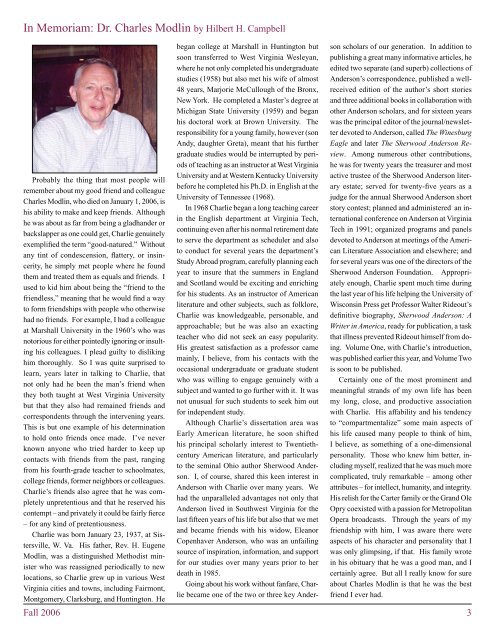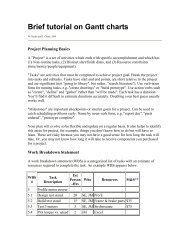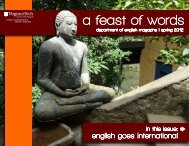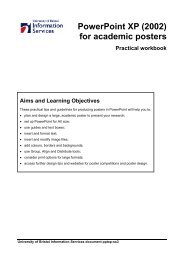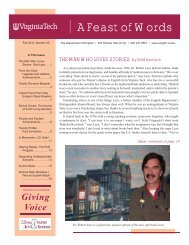A Feast of Words - Fall 2006 - Department of English - Virginia Tech
A Feast of Words - Fall 2006 - Department of English - Virginia Tech
A Feast of Words - Fall 2006 - Department of English - Virginia Tech
Create successful ePaper yourself
Turn your PDF publications into a flip-book with our unique Google optimized e-Paper software.
In Memoriam: Dr. Charles Modlin by Hilbert H. Campbell<br />
Probably the thing that most people will<br />
remember about my good friend and colleague<br />
Charles Modlin, who died on January 1, <strong>2006</strong>, is<br />
his ability to make and keep friends. Although<br />
he was about as far from being a gladhander or<br />
backslapper as one could get, Charlie genuinely<br />
exemplified the term “good-natured.” Without<br />
any tint <strong>of</strong> condescension, flattery, or insincerity,<br />
he simply met people where he found<br />
them and treated them as equals and friends. I<br />
used to kid him about being the “friend to the<br />
friendless,” meaning that he would find a way<br />
to form friendships with people who otherwise<br />
had no friends. For example, I had a colleague<br />
at Marshall University in the 1960’s who was<br />
notorious for either pointedly ignoring or insulting<br />
his colleagues. I plead guilty to disliking<br />
him thoroughly. So I was quite surprised to<br />
learn, years later in talking to Charlie, that<br />
not only had he been the man’s friend when<br />
they both taught at West <strong>Virginia</strong> University<br />
but that they also had remained friends and<br />
correspondents through the intervening years.<br />
This is but one example <strong>of</strong> his determination<br />
to hold onto friends once made. I’ve never<br />
known anyone who tried harder to keep up<br />
contacts with friends from the past, ranging<br />
from his fourth-grade teacher to schoolmates,<br />
college friends, former neighbors or colleagues.<br />
Charlie’s friends also agree that he was completely<br />
unpretentious and that he reserved his<br />
contempt – and privately it could be fairly fierce<br />
– for any kind <strong>of</strong> pretentiousness.<br />
Charlie was born January 23, 1937, at Sistersville,<br />
W. Va. His father, Rev. H. Eugene<br />
Modlin, was a distinguished Methodist minister<br />
who was reassigned periodically to new<br />
locations, so Charlie grew up in various West<br />
<strong>Virginia</strong> cities and towns, including Fairmont,<br />
Montgomery, Clarksburg, and Huntington. He<br />
began college at Marshall in Huntington but<br />
soon transferred to West <strong>Virginia</strong> Wesleyan,<br />
where he not only completed his undergraduate<br />
studies (1958) but also met his wife <strong>of</strong> almost<br />
48 years, Marjorie McCullough <strong>of</strong> the Bronx,<br />
New York. He completed a Master’s degree at<br />
Michigan State University (1959) and began<br />
his doctoral work at Brown University. The<br />
responsibility for a young family, however (son<br />
Andy, daughter Greta), meant that his further<br />
graduate studies would be interrupted by periods<br />
<strong>of</strong> teaching as an instructor at West <strong>Virginia</strong><br />
University and at Western Kentucky University<br />
before he completed his Ph.D. in <strong>English</strong> at the<br />
University <strong>of</strong> Tennessee (1968).<br />
In 1968 Charlie began a long teaching career<br />
in the <strong>English</strong> department at <strong>Virginia</strong> <strong>Tech</strong>,<br />
continuing even after his normal retirement date<br />
to serve the department as scheduler and also<br />
to conduct for several years the department’s<br />
Study Abroad program, carefully planning each<br />
year to insure that the summers in England<br />
and Scotland would be exciting and enriching<br />
for his students. As an instructor <strong>of</strong> American<br />
literature and other subjects, such as folklore,<br />
Charlie was knowledgeable, personable, and<br />
approachable; but he was also an exacting<br />
teacher who did not seek an easy popularity.<br />
His greatest satisfaction as a pr<strong>of</strong>essor came<br />
mainly, I believe, from his contacts with the<br />
occasional undergraduate or graduate student<br />
who was willing to engage genuinely with a<br />
subject and wanted to go further with it. It was<br />
not unusual for such students to seek him out<br />
for independent study.<br />
Although Charlie’s dissertation area was<br />
Early American literature, he soon shifted<br />
his principal scholarly interest to Twentiethcentury<br />
American literature, and particularly<br />
to the seminal Ohio author Sherwood Anderson.<br />
I, <strong>of</strong> course, shared this keen interest in<br />
Anderson with Charlie over many years. We<br />
had the unparalleled advantages not only that<br />
Anderson lived in Southwest <strong>Virginia</strong> for the<br />
last fifteen years <strong>of</strong> his life but also that we met<br />
and became friends with his widow, Eleanor<br />
Copenhaver Anderson, who was an unfailing<br />
source <strong>of</strong> inspiration, information, and support<br />
for our studies over many years prior to her<br />
death in 1985.<br />
Going about his work without fanfare, Charlie<br />
became one <strong>of</strong> the two or three key Anderson<br />
scholars <strong>of</strong> our generation. In addition to<br />
publishing a great many informative articles, he<br />
edited two separate (and superb) collections <strong>of</strong><br />
Anderson’s correspondence, published a wellreceived<br />
edition <strong>of</strong> the author’s short stories<br />
and three additional books in collaboration with<br />
other Anderson scholars, and for sixteen years<br />
was the principal editor <strong>of</strong> the journal/newsletter<br />
devoted to Anderson, called The Winesburg<br />
Eagle and later The Sherwood Anderson Review.<br />
Among numerous other contributions,<br />
he was for twenty years the treasurer and most<br />
active trustee <strong>of</strong> the Sherwood Anderson literary<br />
estate; served for twenty-five years as a<br />
judge for the annual Sherwood Anderson short<br />
story contest; planned and administered an international<br />
conference on Anderson at <strong>Virginia</strong><br />
<strong>Tech</strong> in 1991; organized programs and panels<br />
devoted to Anderson at meetings <strong>of</strong> the American<br />
Literature Association and elsewhere; and<br />
for several years was one <strong>of</strong> the directors <strong>of</strong> the<br />
Sherwood Anderson Foundation. Appropriately<br />
enough, Charlie spent much time during<br />
the last year <strong>of</strong> his life helping the University <strong>of</strong><br />
Wisconsin Press get Pr<strong>of</strong>essor Walter Rideout’s<br />
definitive biography, Sherwood Anderson: A<br />
Writer in America, ready for publication, a task<br />
that illness prevented Rideout himself from doing.<br />
Volume One, with Charlie’s introduction,<br />
was published earlier this year, and Volume Two<br />
is soon to be published.<br />
Certainly one <strong>of</strong> the most prominent and<br />
meaningful strands <strong>of</strong> my own life has been<br />
my long, close, and productive association<br />
with Charlie. His affability and his tendency<br />
to “compartmentalize” some main aspects <strong>of</strong><br />
his life caused many people to think <strong>of</strong> him,<br />
I believe, as something <strong>of</strong> a one-dimensional<br />
personality. Those who knew him better, including<br />
myself, realized that he was much more<br />
complicated, truly remarkable – among other<br />
attributes – for intellect, humanity, and integrity.<br />
His relish for the Carter family or the Grand Ole<br />
Opry coexisted with a passion for Metropolitan<br />
Opera broadcasts. Through the years <strong>of</strong> my<br />
friendship with him, I was aware there were<br />
aspects <strong>of</strong> his character and personality that I<br />
was only glimpsing, if that. His family wrote<br />
in his obituary that he was a good man, and I<br />
certainly agree. But all I really know for sure<br />
about Charles Modlin is that he was the best<br />
friend I ever had.<br />
<strong>Fall</strong> <strong>2006</strong> 3


